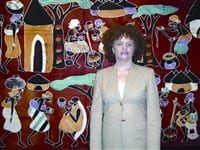Cancer Information Center Celebrates 10 Years
A critical step in understanding a cancer diagnosis and deciding how to overcome it is having timely access to unbiased, easy-to-understand, accurate information. For this reason, in January 1997, the American Cancer Society launched the Society’s National Cancer Information Center (NCIC), a nationwide free helpline accessible 24 hours a day, 7 days a week, by calling (800) ACS-2345 or logging ontowww.cancer.org.
This public service recently marked its 10th anniversary. In its first month, NCIC’s staff of eight cancer information specialists and two oncology nurse information specialists responded to a total of 720 calls. Today, NCIC has a staff of more than 450, including oncology nurses and specialists in clinical trials, foreign languages, and Quitline, the society’s free smoking cessation program.
Responding to an average of 85,000 calls per month, NCIC has seen the total number of incoming calls and E-mails rise to more than one million each year. In other words, if each call lasted only four minutes and came in one at a time, it would take more than seven and a half years to respond to each of them. Quitline alone heard from more than 63,000 callers in the past year.
Working not with scripts, but with an ACS-developed database including the latest information on different cancers, cancer treatments, pain control options, prevention and detection guidelines, and locally available resources, NCIC staff personally address each query, providing cancer information and referrals to society support programs and other available resources.
Each medical document in the database is written and reviewed by a team of medical experts, then checked by an editorial professional who translates difficult medical terminology into easy-to-understand terms. Complicated, unusual medical queries are researched and personally responded to by oncology nurses on staff. Inquiries range from requests for materials to questions about the disease; from financial or prescription drug assistance program guidance to transportation assistance; from how to become a society volunteer to how to donate to the ACS.
NCIC staff work with ACS local offices to maintain extensive, updated listings of local cancer resources, including support groups, patient service programs, and local social services. With this information, NCIC staff put requestors in touch with services in their own communities or in other cities — of particular benefit for callers caring for a loved one from long distance.
NCIC also draws upon the society’s clinical trial matching service to help patients, family members, and health care providers locate trials most appropriate to a patient’s medical and personal situation. Specialists are on hand to answer questions about clinical trial participation and open the door to treatment options available through research studies.
The National Cancer Information Center is part of the American Cancer Society Cancer Resource Network, a free, comprehensive resource to help patients and their caregivers manage the impact of cancer on their lives by providing up-to-date cancer information, help with day-to-day issues, and emotional support.



Comments are closed.